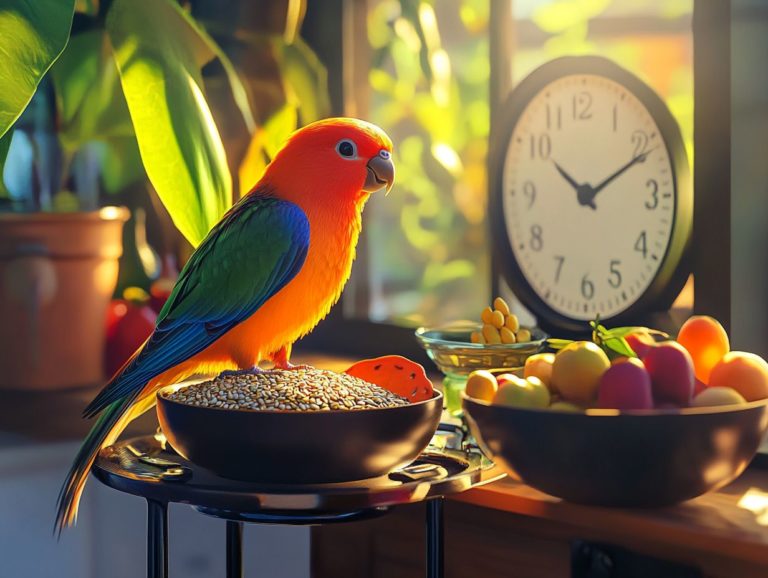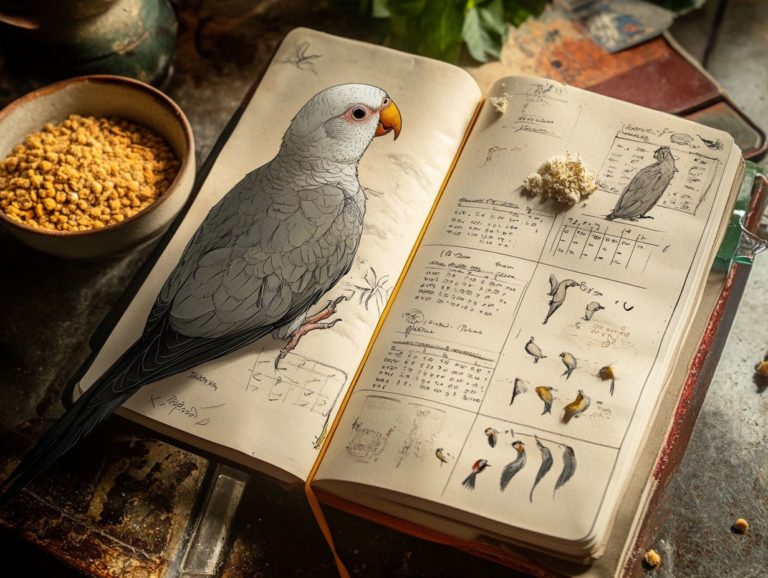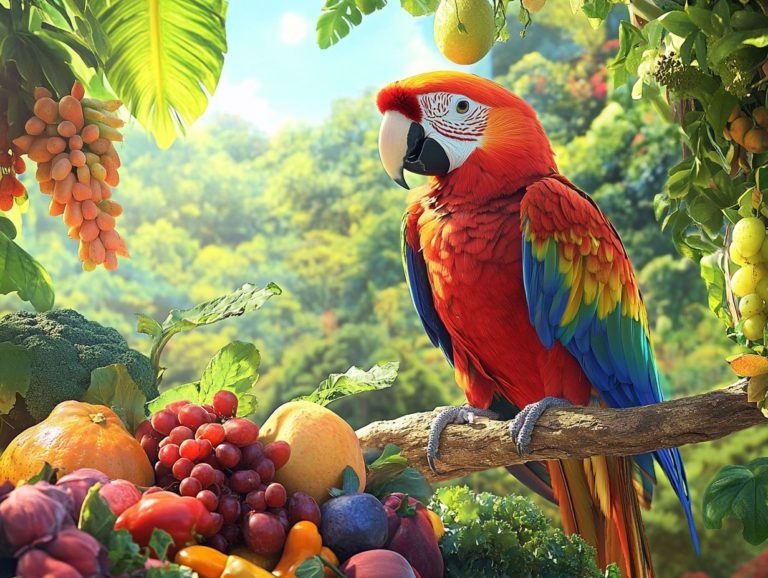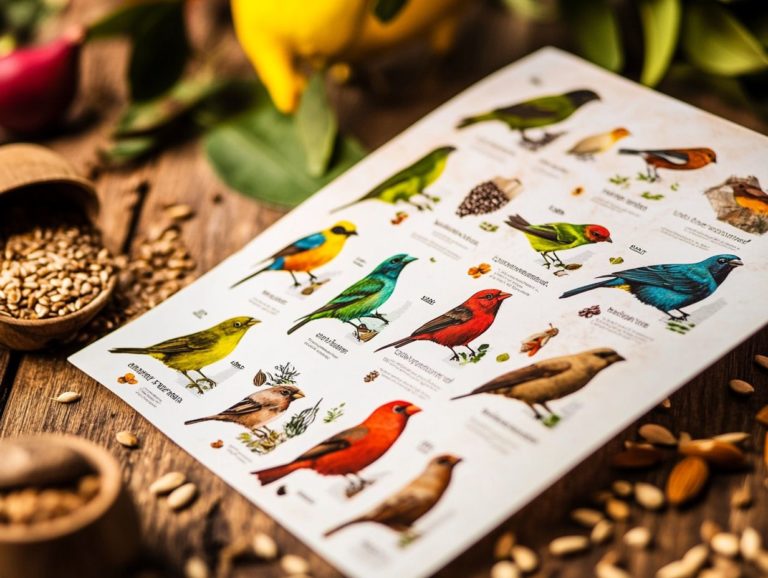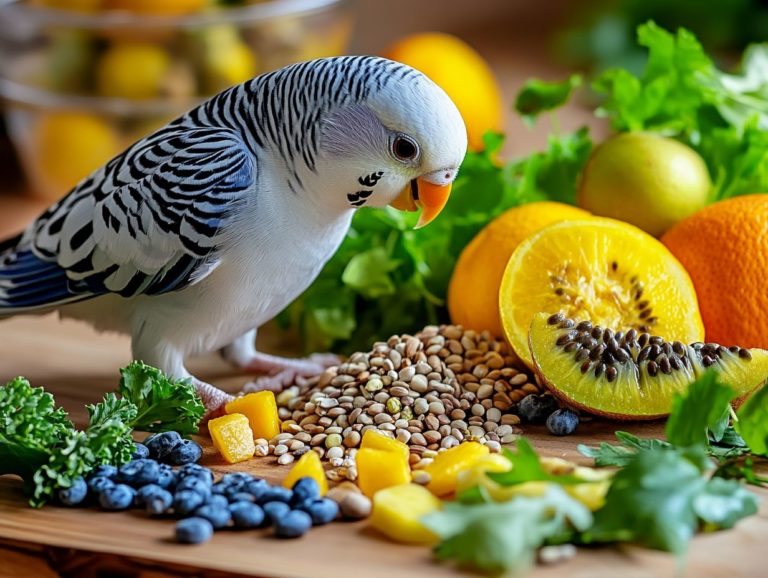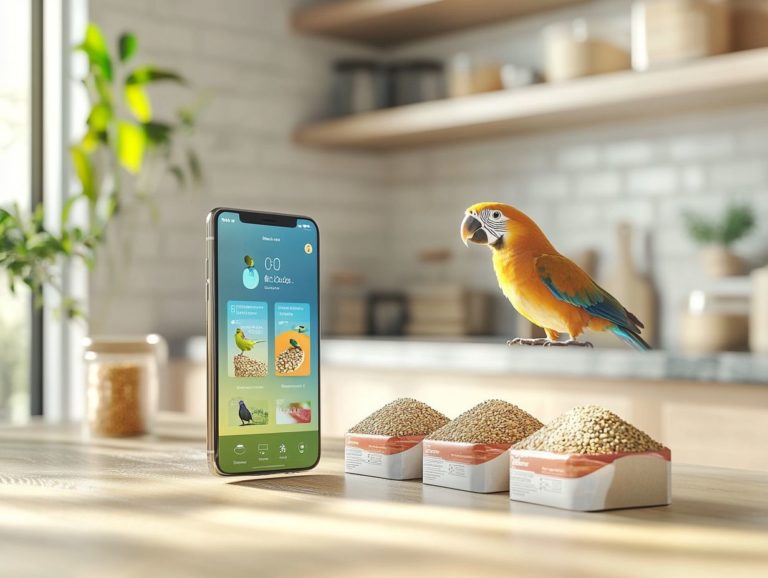The Importance of Fresh Fruits for Your Bird’s Diet
Fresh fruits aren’t merely a delightful indulgence for your feathered companions; they are essential elements of a balanced diet.
Rich in vital vitamins, minerals, and antioxidants, fresh fruits can significantly enhance your bird’s overall health and well-being. This article delves into the nutritional benefits of various fruits, recommending specific types tailored for different bird species. It also provides guidance on how to seamlessly incorporate these options into their meals.
Moreover, it highlights the signs of dietary imbalances and stresses the importance of variety in your bird’s nutrition.
Discover exciting ways to keep your feathered friends healthy and happy!
Contents
- Key Takeaways:
- Why Fresh Fruits are Essential for Birds
- Types of Fresh Fruits for Birds
- How to Incorporate Fresh Fruits into Your Bird’s Diet
- Signs of Deficiency and Excess in Fruit Consumption
- Other Factors to Consider for a Balanced Bird Diet
- Frequently Asked Questions
- What are the benefits of incorporating fresh fruits into my bird’s diet?
- Which fresh fruits are safe for my bird to consume?
- How often should I offer fresh fruits to my bird?
- Can I give my bird any type of fruit from my own meals?
- What are some signs that my bird may not be getting enough fresh fruits in their diet?
- Are there any precautions I should take when offering fresh fruits to my bird?
Key Takeaways:
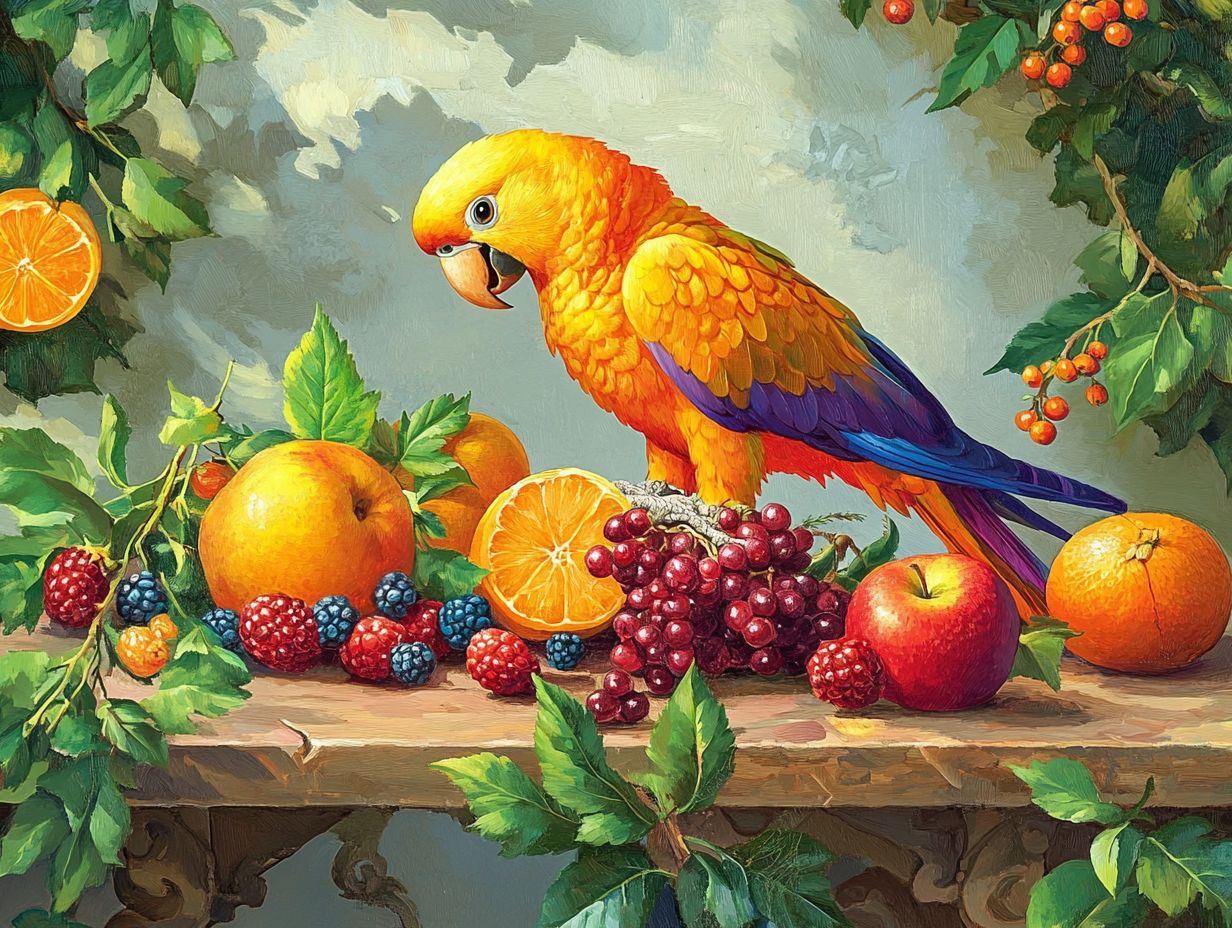
- Incorporating fresh fruits into your bird’s diet is crucial for providing them with essential nutrients that promote overall health and well-being.
- Different bird species may have specific fruit preferences, so it is important to research and offer a variety of recommended fruits to ensure a balanced diet.
- Fruits are important, but proper serving sizes and moderation are key to preventing deficiencies or excesses. Supplements and variety in nutrition should also be considered for a well-rounded diet.
Why Fresh Fruits are Essential for Birds
Fresh fruits are essential for the well-being of birds, especially parrots and similar species. They provide crucial nutrients that enhance overall health.
These fruits, whether seasonal delights like apples, oranges, or berries, are not just delectable but also act as a natural source of hydration and energy for these fruit-eating birds.
By integrating a diverse array of fresh fruits into their diets, bird owners can help ensure that their feathered companions enjoy optimal health, vibrant plumage, and a cheerful disposition.
Nutritional Benefits
The nutritional benefits of incorporating fresh fruits into a bird’s diet are truly remarkable, especially when you consider the importance of variety in bird diet and the essential vitamins and minerals these foods provide.
Fresh fruits are vibrant and colorful. They are rich in vital nutrients like vitamin A, found in mangoes and oranges, which play a crucial role in supporting vision and immune function.
Bananas, for instance, deliver potassium, essential for heart health and muscle function, while berries are packed with antioxidants that combat oxidative stress.
Unlike processed diets that may fall short in offering these natural advantages, fresh fruits ensure that parrots receive wholesome nutrition. Tailoring a bird’s diet with these unprocessed selections accommodates individual taste preferences and significantly enhances overall health, reflected in their plumage, energy levels, and longevity.
Types of Fresh Fruits for Birds
You have a wide variety of fresh fruits at your disposal to offer your feathered friends. The selection can differ based on the species and the season, allowing you to provide parrots and other avian companions with a balanced diet that truly satisfies their nutritional needs.
Recommended Fruits for Different Species
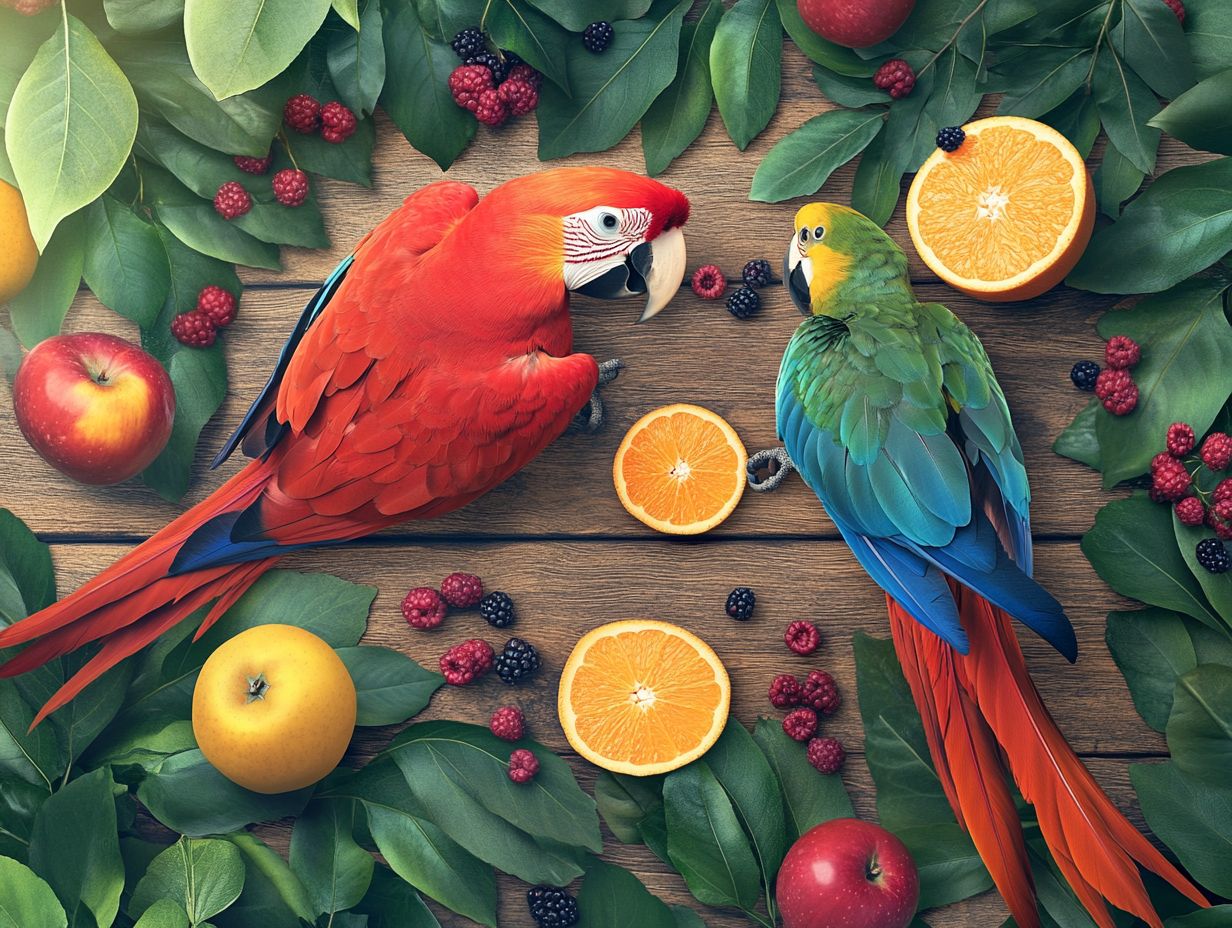
Different bird species come with their own unique dietary preferences, making it essential for you to tailor the selection of recommended fruits to meet the specific nutritional needs of each one, particularly when it comes to the ever-enthusiastic parrots and their penchant for fresh food.
While some parrots might thrive on a diet abundant in apples and bananas, others may gravitate toward the vibrant textures and tropical flavors of fruits like mango and papaya. Foraging is a key aspect of their eating habits, encouraging natural exploration and selection.
Recognize that each species may have distinct favorites that cater to their health and digestive requirements. Crafting an appropriate custom diet not only enriches their lives but also supports their overall well-being. This ensures they receive the essential vitamins and minerals tailored specifically to their type, allowing them to flourish.
How to Incorporate Fresh Fruits into Your Bird’s Diet
Incorporating fresh fruits into your bird’s diet requires careful thought. It’s essential to introduce these nutritious options effectively. Additionally, understanding the importance of hydration for pet birds ensures a well-balanced feeding regimen that promotes health and prevents malnutrition.
By doing this correctly, you can enhance your bird’s overall well-being and vitality.
Proper Serving Sizes and Frequency
To maximize the benefits of fresh fruits without overindulgence, it’s vital to establish appropriate serving sizes and feeding frequency.
This means understanding the specific dietary needs of the bird species in your care, as each has its unique nutritional needs. Introduce fresh fruits by offering a small portion, about one to two tablespoons, a few times a week, tailored to your birds’ size and preferences.
Balancing fruit intake with other food components, like seeds and pellets, is crucial for a well-rounded diet. Keep an eye on your birds’ responses; watch for any changes in weight or behavior to determine if adjustments are needed, ensuring they maintain optimal health and vitality.
Signs of Deficiency and Excess in Fruit Consumption
Recognizing the signs of deficiency and excess in fruit consumption is critical for your birds’ health. Both can lead to serious behavioral issues and malnutrition, making it essential to be attentive to their needs.
Identifying and Addressing Imbalances
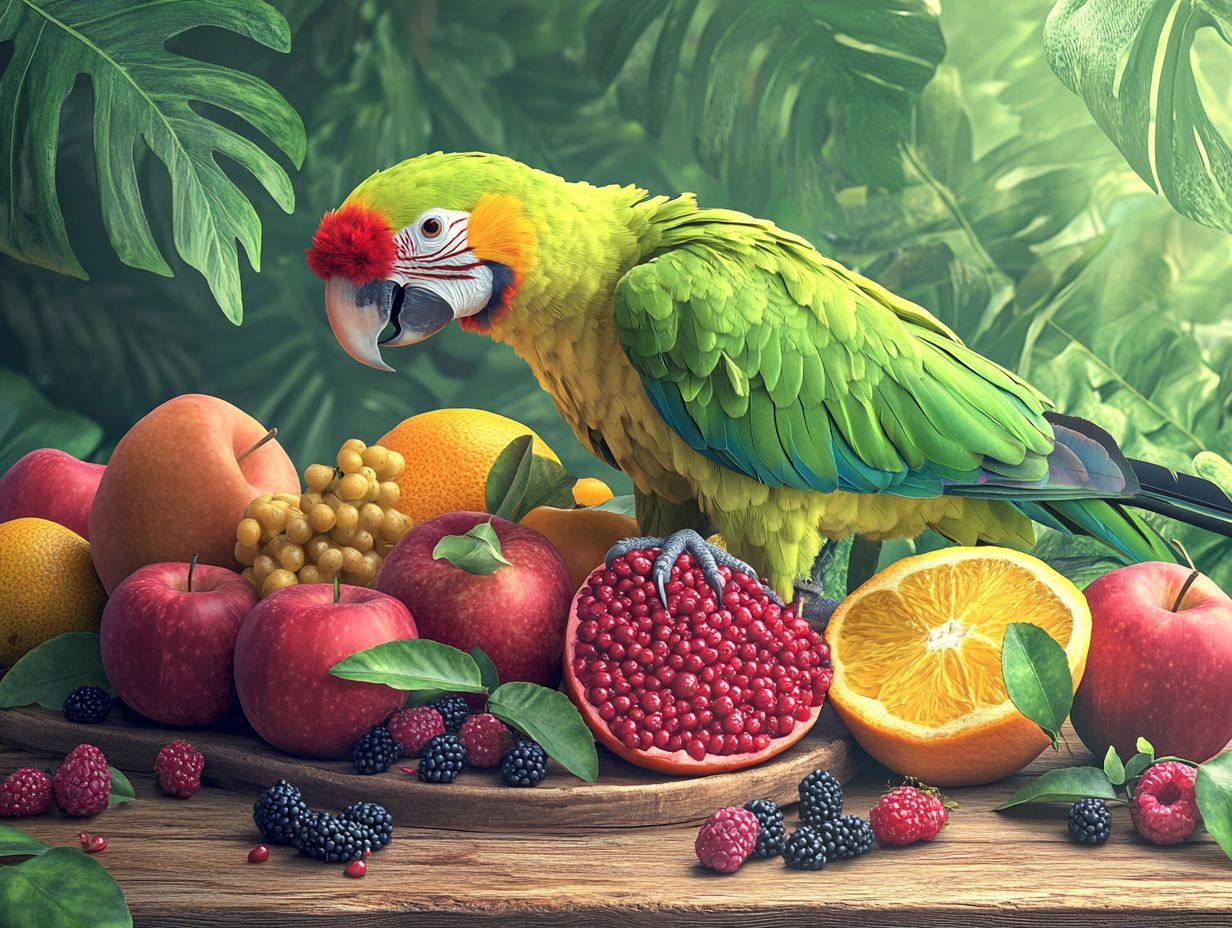
Addressing nutritional imbalances is key to ensuring your bird’s long-term health and happiness, especially when incorporating fresh fruits.
Observe your feathered friend for signs of malnutrition, such as lethargy, dull plumage, or changes in behavior. These may indicate deficiencies that need your immediate attention.
It’s important to evaluate the types of fruits you offer; not all fruits deliver the necessary vitamins and minerals. A diverse array of fruits, like berries, apples, and leafy greens, can create a balanced diet.
Adjusting the ratio of fruits to pellets can further boost their health, ensuring essential nutrients are balanced for optimal growth and vitality.
Other Factors to Consider for a Balanced Bird Diet
Creating a balanced diet for birds involves more than just fresh fruits. It requires understanding various dietary components, including the importance of supplements and a variety of foods for optimal health.
Supplements and Variety in Nutrition
Incorporating supplements into your bird s diet can enhance their nutritional intake, especially when fresh food alone may not meet their specific health needs.
These dietary aids ensure your pet birds receive the vital vitamins and minerals that might be lacking in their regular meals. Fresh fruits and vegetables are great, but they sometimes fall short of delivering everything needed for optimal health. Adding a range of supplements can really help create a balanced diet that supports strong immune systems, vibrant plumage, and increased energy levels.
The value of variety cannot be overstated; different supplements can meet unique nutritional needs, enhancing overall well-being and fostering a lively, active lifestyle for your birds.
Frequently Asked Questions
What are the benefits of incorporating fresh fruits into my bird’s diet?
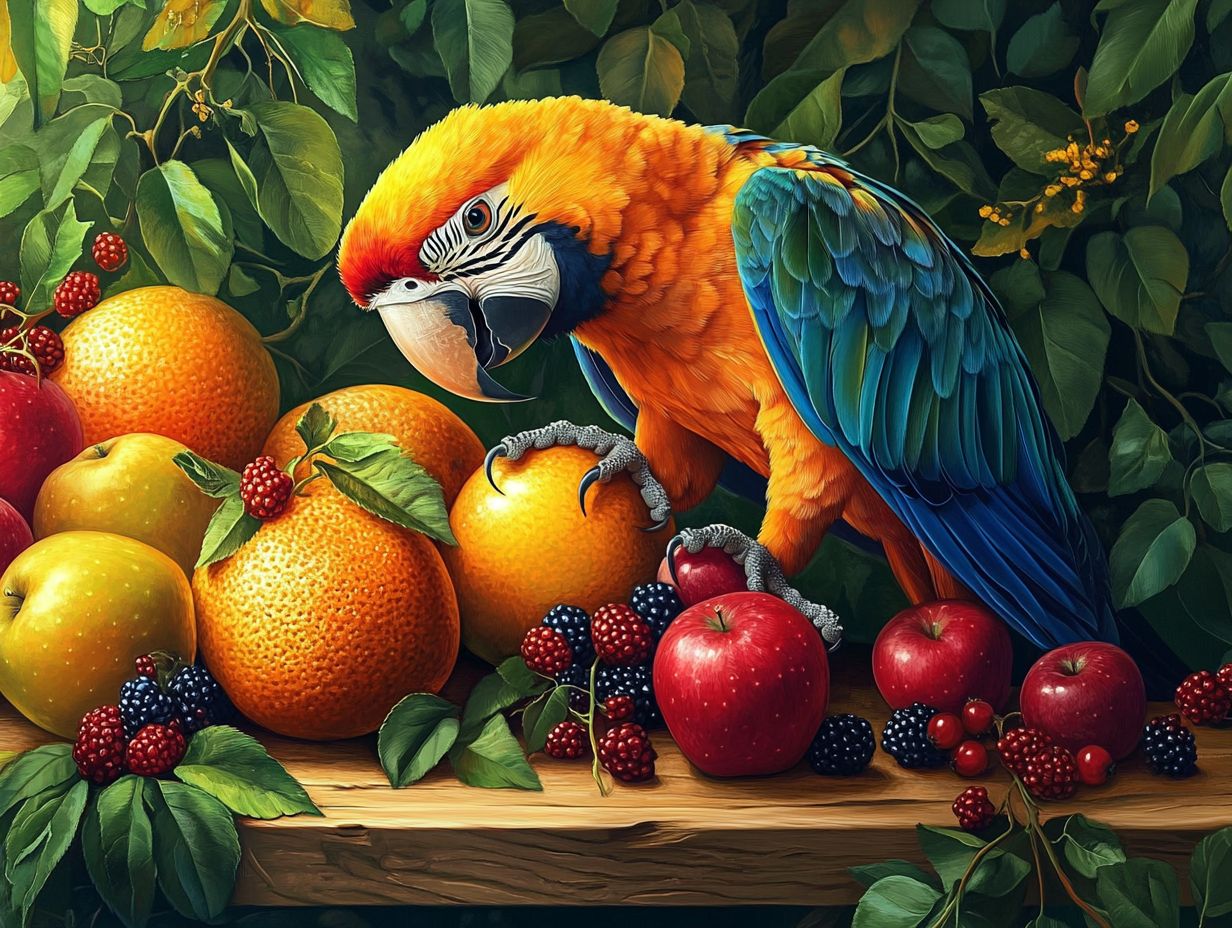
Fresh fruits provide essential vitamins, minerals, and antioxidants vital for your bird’s overall health and well-being. They also add variety and stimulation to their diet.
Which fresh fruits are safe for my bird to consume?
Safe choices for your bird include apples, bananas, and berries. Always check which fruits are safe for your bird’s species to avoid any toxic options.
How often should I offer fresh fruits to my bird?
Offer fresh fruits daily in small amounts. They should not make up more than 10% of your bird’s total diet to ensure a balanced nutrition.
Can I give my bird any type of fruit from my own meals?
No, avoid giving your bird any fruit that has been cooked, seasoned, or processed. Stick to fresh, raw fruits for their safety and health.
What are some signs that my bird may not be getting enough fresh fruits in their diet?
Watch for signs like weight loss or dull feathers. These could mean your bird isn’t getting enough fresh fruits, so act quickly and consult a vet!
Are there any precautions I should take when offering fresh fruits to my bird?
Always wash fruits thoroughly! Cut them into small pieces to keep your bird safe. Also, check for any seeds or pits that may be toxic and should be removed before serving.

